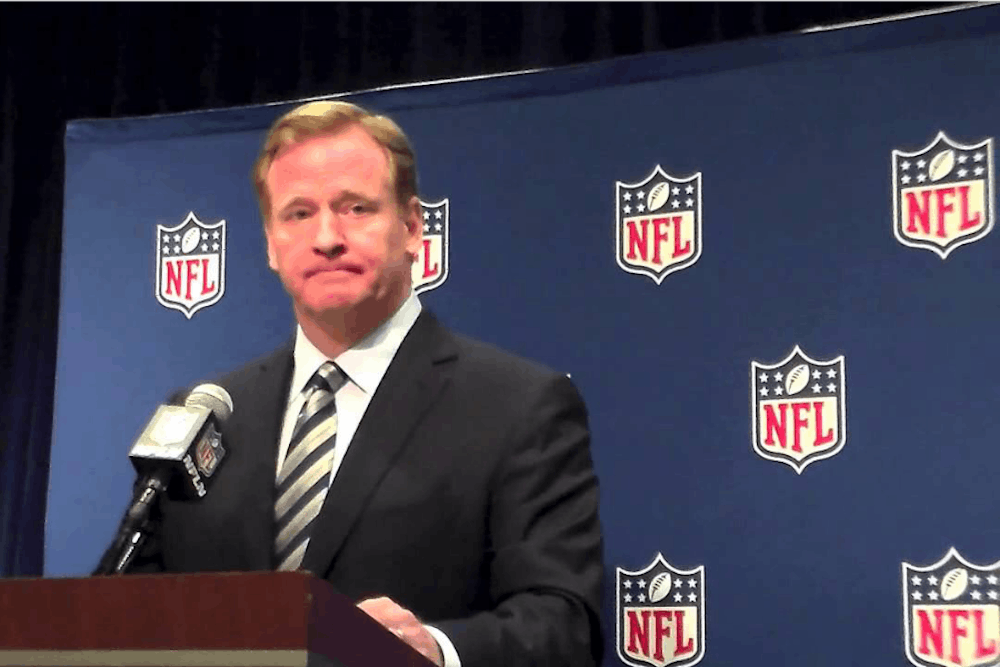By Michael Ittu, For The Miami Student
Journalist Christine Brennan and activist Wade Davis spoke to students Monday night about the current conditions for women and LGBTQ athletes in the world of sports today.
The two were part of the "You Can Play: LGBTQ Athletes & Sports" Lecture Series event.
Brennan, an author and national sports columnist for USA Today, began her career in sports in 1981. She became the first woman sports reporter to write for The Miami Herald, where she worked until 1984.
In 1985, she became the first woman to cover the Washington Redskins, and in 1988 became the first president of the Association for Women in Sports Media.
She has covered 15 consecutive Olympics, and has written acclaimed articles about homophobic legislation and LGBTQ athletes, like Michael Sam and Jason Collins.
After playing football at Weber State University, on a number of NFL practice teams and in NFL Europe, Davis has since joined a small number of professional athletes that have come out as gay.
In February 2013, he joined the You Can Play Advisory Board and was named the Executive Director the following August.
Brennan began the discussion by analyzing the ways sports shape culture and society today, specifically LGBTQ athletes.
"Each one of these stories in sports allows us to go into a national conversation on very important issues, and so it is with the issue of the gay athlete and the LGBTQ community - the story that I think resonates as much as any story in this time and place in our history," Brennan said.
Brennan suggested this topic would only continue to grow and develop.
"Fifty years from now ... students will study this era, and they'll study it because of many things," Brennan said. "Because of Title IX, the advancement of women in sports, obviously the advancement of African-Americans in sports and the issue of the gay athlete and equality for all."
Brennan said she first encountered the subject when she covered figure skating.
"That was when I started to realize that the skating community was losing so many talented men - coaches, choreographers, Olympic gold medalists in '72 and '76 - all gone because of AIDS," Brennan said.
Davis discussed his own connection to LGBTQ issues.
He recalled his introduction to football was via a game called "Smear the Queer."
"Even though I was six or seven years old at the time, that was my first introduction for what you did to queer people, and that was to smear them or to bash them," Davis said.
It wasn't until later he came to terms with his own sexuality.
When describing the moment he realized he was gay, Davis shared a story of the only openly gay student in his high school. For privacy, Davis referred to him as John Smith.
"John Smith was the most courageous person I had ever known, but because John Smith lived in his truth I hated him," Davis said.
Sharing a great deal of detail in personal account, Davis explained how he spent many years bullying John Smith, often referring to him with gay slurs.
"John Smith was everything I wanted to be. John Smith was his authentic self, and I hated John Smith because I truly hated myself," Davis said. "I know now that hatred is a form of self-hatred and that I was giving so much to my internal phobia and shame, that I couldn't see the beauty in John Smith."
Shaping the discourse into more modern terms, Davis began to speak about the emotions and struggles he dealt with as a gay NFL player, and about how he had found comfort in his sexuality in the game itself.
"Oftentimes we think of sports as a space that isn't productive for a gay athlete, but for myself it was actually, strangely enough, the safest place for me," Davis said. "When I was on the football field, or in the locker room, or in the weight room, I didn't think about the fact that I was gay, but when I was alone in my own silence, that was when being gay became so deafening that I almost couldn't survive."
The two speakers discussed the process of dismantling stereotypes associated with gay people and the impact it would have on the future of gay athletes in the sports world.
"These are important stories," Brennan said. "As a journalist who covers many issues, [the issue of the gay athlete] is one of the big ones. It is an important piece of not only our history as a culture and in sports, but American history, and there's no doubt that as sports goes, so goes the nation."

